Nope, not another list of “classic” SF films, but SF based on literary classics
.
When SF (tries) to go highbrow, what better way to exude a veneer of respectability than by plundering some literary greats? We’ve tried to stick to no-fantasy classics, because otherwise we open the floodgates to a zillion versions of A Christmas Carol , but then gratuitously waive that rule when it comes to Shakespeare because, well, we make the rules, okay?
1 Age Of The Dragons
Based on: Moby Dick by Herman Melville
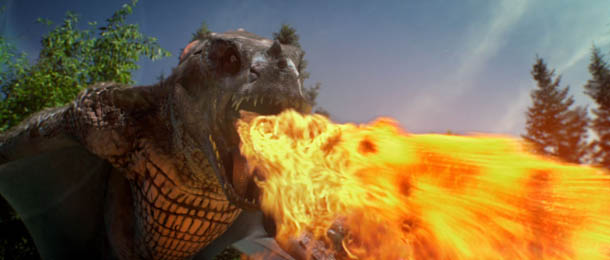
The movie’s tagline is true: this is Moby Dick with dragons, with Danny Glover’s aged Ahab hunting the great white whale of a dragon who got the better of him many years before. It’s a glorious idea in theory – harpooning dragons is cool – but it’s way too faithful to the original book, which is both admirable and foolish. Long scenes with characters philosophising over the folly of revenge might be interesting in a slow-burn drama, but a film with “dragons” in the title will draw an audience who want, well, dragons , and they’ll be bored. This is part serious drama and part rollicking fantasy, and neither genre comes out the winner. But it does feature a pipe-smoking Vinnie Jones performing a deathly serious soliloquy about dragon-slaying.
.
.
Get sneak previews, exclusive competitions and details of special events each month!
2 Robinson Crusoe On Mars
Based on: Robinson Crusoe by Daniel Defoe
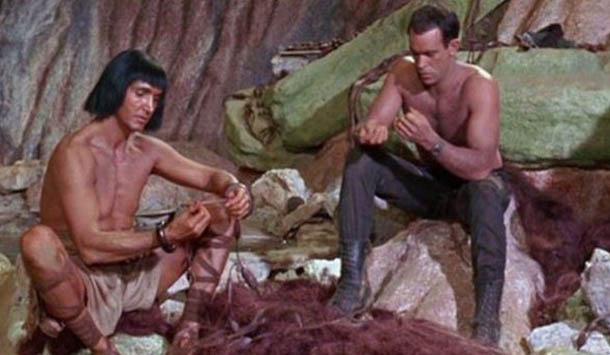
Although trading standards never investigated, this 1964 movie directed by Byron Haskin, doesn’t actually feature Robinson Crusoe, just an astronaut stranded on the Red Planet with enough literary knowledge to call his alien mate Friday when he frees him from slave labour. It’s only very loosely based on the book, and rarely apes specific scenes or storylines (darn it, we’d love to see a sci-fi twist on the classic footprints moment) though it does reimagine the cannibals as alien miners. In fact, the mining ships look suspiciously familiar. Exactly the same, in fact, as the Martian War machines from one of Haskin’s previous films, War Of The Worlds (1953). Well, it makes some kind of logic…
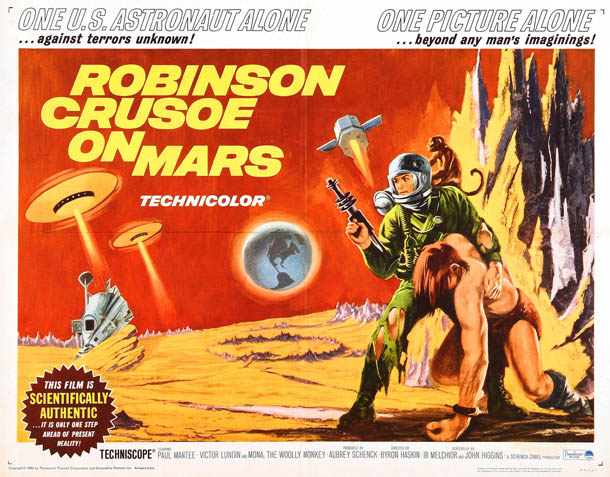
.
.
3 Pride And Prejudice And Zombies
Based on: Pride And Prejudice by Jane Austen
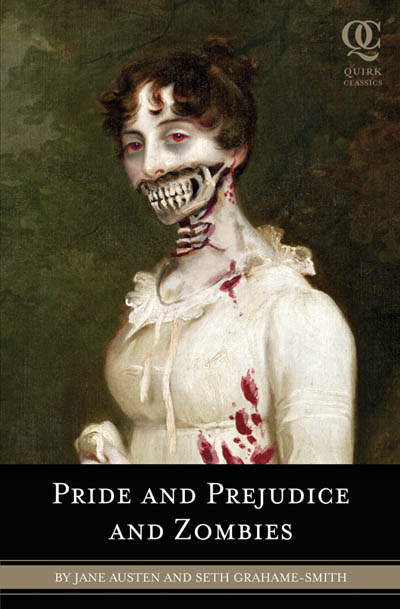
This is the book that created a new trend for literary mash-ups, but to be honest, we still reckon the cover art and the title are the best thing about it. Basically it’s just Austen’s original text amended here and there to add in gratuitous zombie carnage; the words are about 85% Austen’s and 15% Grahame-Smith’s of which here are a few:
The second unmentionable was a lady, and much longer dead than her companion. She rushed at Elizabeth, her clawed fingers swaying clumsily about. Elizabeth lifted her skirt, disregarding modesty, and delivered a swift kick to the creature's head, which exploded in a cloud of brittle skin and bone. She, too, fell and was no more.
It is funny, for about 10 pages then the joke wears very thin indeed. Especially as you know the plot already. However it was a huge, huge hit, there’s going to be a movie, and it spawned a whole slew of similar books (we could have made this list a top 20 easily, but that seemed like cheating), including, Sense And Sensibility And Sea Monsters , Android Karenina , The Moewmorphosis and at least three Pride And Prejudice And Zombies sequels. Honestly, they’re all much better in your imagination.
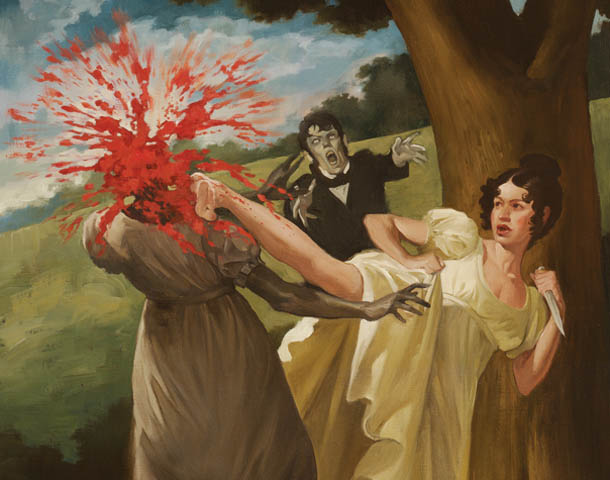
.
.
4 Thirst
Based on: Thérèse Raquin by Émile Zola
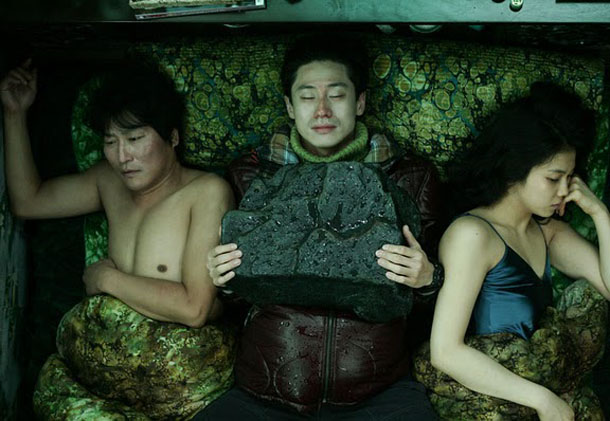
How does a vampire movie win a Jury Prize at the Cannes Film Festival? Well, being foreign language helps, but the real clincher is to base it on a literary classic by Émile Zola. That’s bound to tick the highbrow boxes. This was written, produced and directed by Park Chan-wook, who reckoned, “It is about vampires. But it is also more than that. It is about passion and a love triangle. I feel that it is unique because it is not just a thriller, and not merely a horror film, but an illicit love story as well.” Which is where it parallels the original novel, in which an unhappily married woman has an affair with one of her husband’s friends. They also have similarly downbeat endings, but we don’t want to give away any spoilers… though come to think of it, if the book’s such a classic, how come you don’t all know the ending anyway?
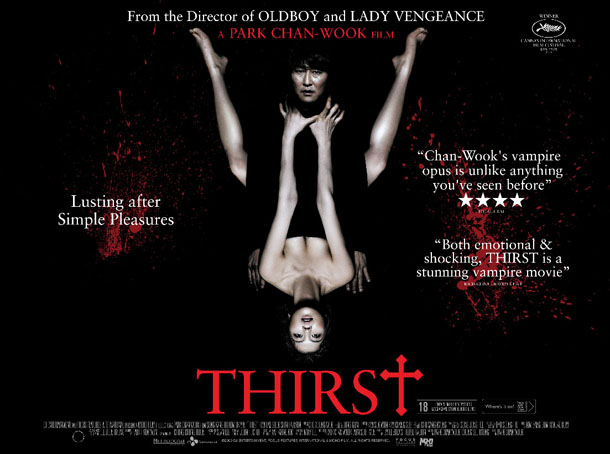
.
.
5 Treasure Planet
Based on: Treasure Island by Robert Louis Stevenson
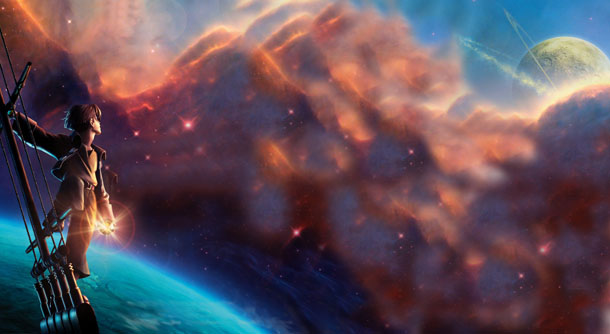
This one is a true sci-fi adaptation of a classic, in which not even the names have been changed to protect the literary snobs. Disney’s 43rd animated film virtually retells Stevenson’s famous tale episode by episode, just setting it in space instead. All the familiar characters are here, some given more of a makeover than others but all clearly identifiable. There’s a Jack Hawkins (still a young whippersnapper human), a six-eyed, feline looking Captain Flint, a robot named B.E.N. (Ben Gunn, of course), a cyborg John Silver. Jack is warned “Beware the cyborg” rather than “the black spot”. There’s a holographic treasure map. You get the idea. But we don’t recall Jim being into surfing in the book, let alone solar surfing…
.
.
6 Doctor Who “The Androids Of Tara”
Based on: The Prisoner Of Zenda by Anthony Hope Hawkins
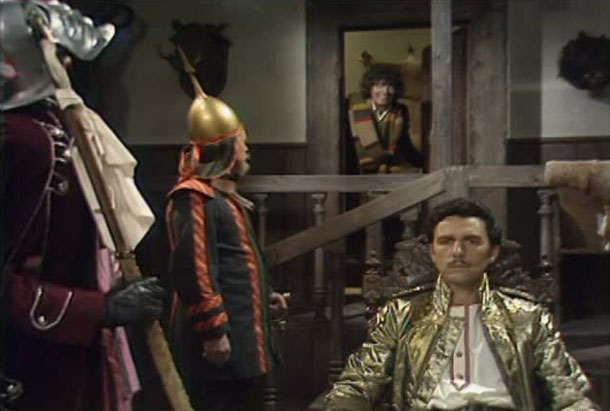
There are a whole bunch of Doctor Who stories which owe a huge debt to the classics. “The Brain Of Morbius” was a thinly-disguised Frankenstein makeover, while both “Underworld” and “The Horns Of Nimon” plundered Greek mythology for storylines. But the nearest the show came to actually plagiarising an existing novel was in 1978’s Tom Baker story “The Androids Of Tara”. The inspiration was The Prisoner Of Zenda , a novel published in 1894, set in the fictional kingdom of Ruritania, whose king is abducted on the eve of his coronation. The hero of the book is an English gent on holiday who looks exactly like the monarch, and is persuaded to pretend that he is the King. In the Who tale, the Doctor has to do an MOT on an android double to save the day. It’s actually a very elegant and (for the time) sumptuous piece of ’70s Who that perfectly captures the feel of the book while adding some clever SF twists. There’s a really rubbish Taran wood beast, though…
.
.
7 The Stars My Destination/Gankutsuou
Based on: The Count Of Monte Cristo by Alexandre Dumas

Alfred Bester himself described his book as a science fiction version of The Three Musketeers author Dumas’s other most famous book. Both feature a main character wrongfully imprisoned who escapes and reinvents himself as an upper class mover and shaker so that he can exact his revenge. Both books contain themes of hope, justice, vengeance, mercy and forgiveness. But one features spaceships and telepathy, so we now which one we prefer.
There’s also a psychedelic, anime sci-fi version of the tale called Gankutsuou , which is probably more famously known for a visual style that near burns your retinas.
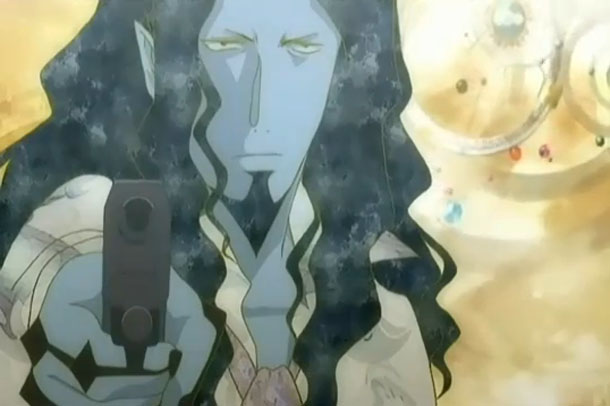
.
.
8 Jenna Starborn
Based on: Jane Eyre by Charlotte Brontë
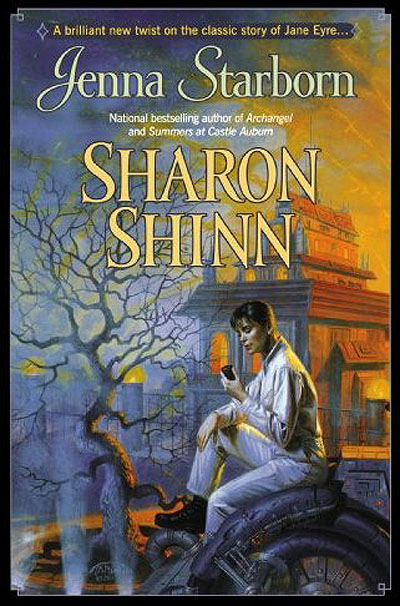
Not so much a science fiction version of Jane Eyre, as Jane Eyre retold in the far future. What’s the difference, you might be thinking? Well, the book doesn’t so anything SF with the plot – it’s still a stately romance, it just happens to take place elsewhen. The SF trappings are all carefully tailored to make sure the future society resembles Bronte’s England as much as possible. It all seems a bit pointless for anyone who’s read the original, and hard SF nuts should steer well clear because this is more Mills and Boon than Pournelle and Niven, but hell, it’s still a cracking gothic romance.
.
.
9 Ulysses 31
Based on: The Odyssey by Homer
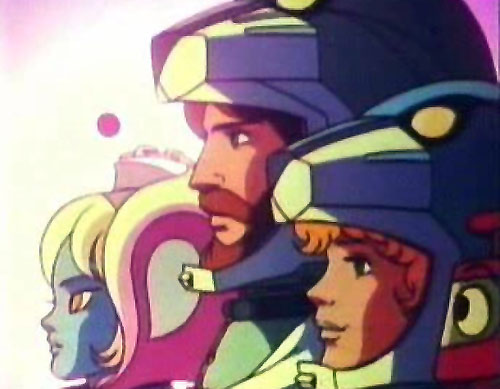
This early ’80s kids cartoon series (adapted from a Japanese anime) is probably more famous for having a theme tune that clings to your brain like a sonic limpet than its classical roots. But as one person on the SFX team admitted, he learned nearly every he knows about Greek mythology from the show. It’s an SF version of Homer’s The Odyssey with a space captain called Ulysses commanding a spaceship called the Odyssey, who’s sent by Zeus on a voyage to find Hades, and who has encounters with the Cyclops and the like. Honestly, watch this and Clash Of The Titans and you will never need to read the original.
.
.
10 Maskerade
Based on: The Phantom Of The Opera by Gaston Leroux
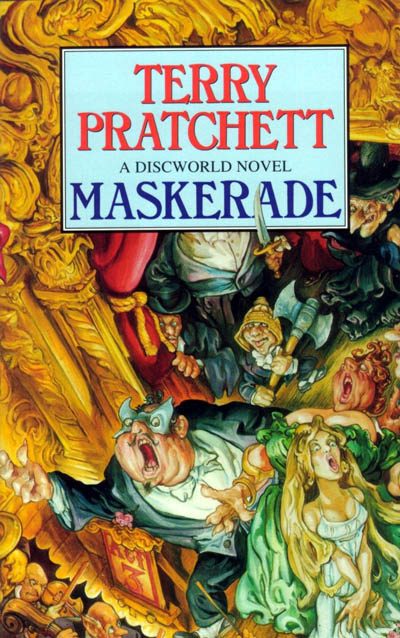
When Agnes Nitt, the small-town trainee witch with the supernatural singing voice, arrives at Ankh Morpork’s Opera House, she’s swiftly caught up in a story instantly familiar to anyone who’s seen Andrew Lloyd Webber’s version of The Phantom Of The Opera . Musically talented ghosts, mysterious goings on and a healthy amount of Pratchett parody are littered throughout Maskerade , and would probably infuriate opera lovers everywhere. Hurrah!
.
.
11 Gnomeo And Juliet
Based on: Romeo And Juliet by William Shakespeare
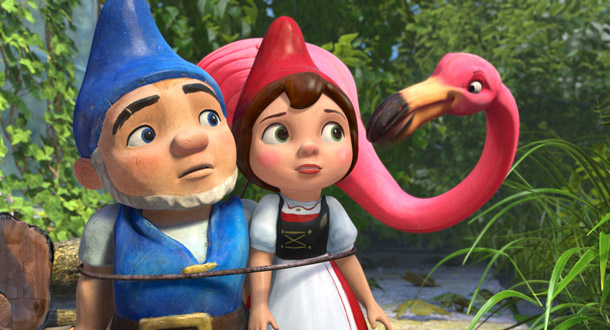
Romeo and Juliet is just crying out for SF and fantasy retellings. You could argue there‘s an element of Shakey’s star-crossed lovers in the mix of Underworld somewhere, but a proper West Side Story -style makeover with a werewolf and a vampire falling for each other has got to be bubbling way in some Hollywood exec’s overheated brain, surely? In the meantime, we’ve got the tale retold with Gnomes. Even though the film only loosely follows the play, the main characters are all there, with only a few slight alterations to names (Juliet Capulet, Gnomeo Montague, Tybalt). But this being a kids’ film, the writers sadly decided to ignore the original’s suicide-packed ending. Meanwhile, B-movie masters Troma also produced their version of the tale, Tromeo And Juliet, while in Japan they produced the sci-fi anime version called Romeo X Juliet .
.
.
12 Rosencrantz And Guildenstern Are Undead
Based on: Rosencrantz And Guildenstern Are Dead by Tom Stoppard, via William Shakespeare
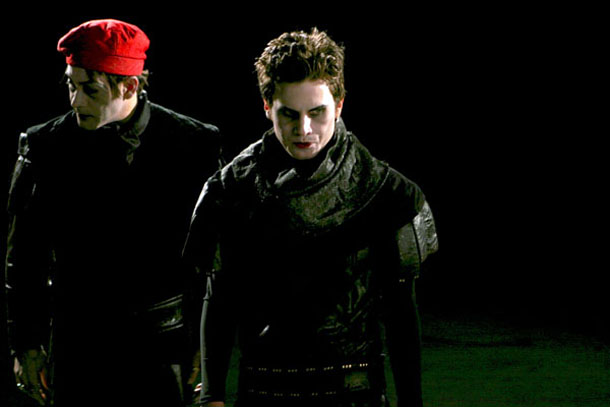
Any attempt to summarise this bizarre US indie movie is doomed to failure. But bear with us. It’s a film about a cast and crew putting on a weird new version of Hamlet that’s been written by a vampire who is actually the Horatio from Shakespeare play, still alive after all these years. During the film we get to see bits of the “play within the film”, in which Hamlet, Rosencrantz And Guildenstern are all turned into vampires by Horatio (he also tries to turn Ophelia but she drowns herself first). Then it all becomes a centuries-spanning hunt for the Holy Grail with clues hidden in Shakespeare’s Hamlet , WS Gilbert’s Rosencrantz And Guildenstern , Tom Stoppard’s Rosencrantz And Guildenstern Are Dead and this new play Rosencrantz And Guildenstern Are Undead . Confused? Yeah, so were most people who saw the film…
.
.
13 Henry 5
Based on: Henry V by William Shakespeare
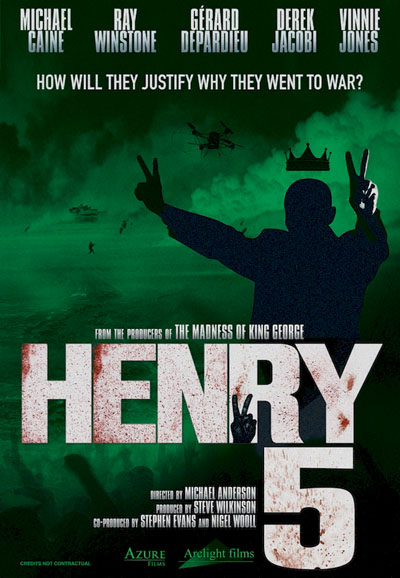
Okay, we’re cheating with this one, because it hasn’t actually been made yet (and possibly never will) but we’re a superstitious bunch and if we hadn’t added it in there’d be 13 pages to this feature. It’s an SF update of Shakespeare’s Henry V which, according the company’s website , will star Michael Caine, Ray Winstone, Vinnie Jones, Gerard Depardieu, Derek Jacobi. “In an age of apocalypse, in a land without a leader, a dissolute prince finds redemption when he crushes a rebellion that threatens to destroy his father's kingdom,” says the official blurb. “But upon assuming the throne himself, he immediately engineers a war against a neighbouring state to slake his lust for power. Despite his enemy possessing weaponry rendering their forces almost invincible, the newly crowned king seizes a glorious victory from the jaws of defeat by ruthlessness and cunning. But for all his wiles there's one thing the young monarch has overlooked. Just as he's prepared to do whatever it takes to ensure victory, so is his enemy...” It all sounds too good to be true. And there hasn’t been news on it for a while. But you never know…
.
.
14 Forbidden Planet
Based on: The Tempest by William Shakespeare
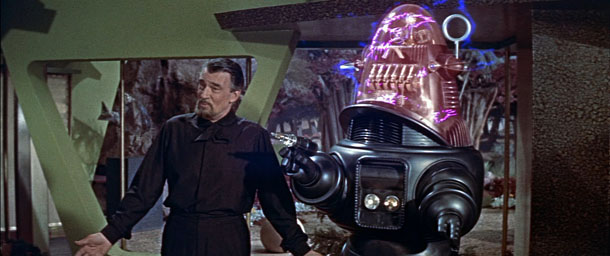
We saved the best till last. Admit it – you’ve been going through this list wondering when we’d get to this one. Forbidden Planet is, simply, a work of genius, cleverly taking Shakespeare’s The Tempest as a template, but then weaving around that a science fiction concept that was pretty blimmin’ hardcore for the 1950s, and getting all Freudian with its id and superego shenanigans. The play’s Prospero becomes Dr Morbius; his daughter Miranda becomes Altaira; the monstrous Caliban becomes the Id monster; the spirit Ariel becomes Robbie the Robot; Ferdinand becomes Commander Adams; the island becomes the planet Altair; the ship becomes a spaceship. And it all works so beautifully. All it needs is a few rhyming couplets and some codpieces.
SFX Magazine is the world's number one sci-fi, fantasy, and horror magazine published by Future PLC. Established in 1995, SFX Magazine prides itself on writing for its fans, welcoming geeks, collectors, and aficionados into its readership for over 25 years. Covering films, TV shows, books, comics, games, merch, and more, SFX Magazine is published every month. If you love it, chances are we do too and you'll find it in SFX.


